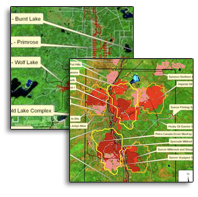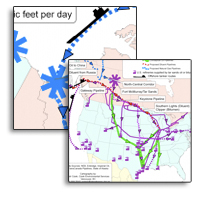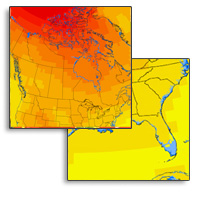Tar Sands 101
The Tar Sands "Gigaproject" is the largest industrial project in human history and likely also the most destructive. The tar sands mining procedure releases at least three times the CO2 emissions as regular oil production and is slated to become the single largest industrial contributor in North America to Climate Change.
The tar sands are already slated to be the cause of up to the second fastest rate of deforestation on the planet behind the Amazon Rainforest Basin. Currently approved projects will see 3 million barrels of tar sands mock crude produced daily by 2018; for each barrel of oil up to as high as five barrels of water are used.
Human health in many communities has seriously taken a turn for the worse with many causes alleged to be from tar sands production. Tar sands production has led to many serious social issues throughout Alberta, from housing crises to the vast expansion of temporary foreign worker programs that racialize and exploit so-called non-citizens. Infrastructure from pipelines to refineries to super tanker oil traffic on the seas crosses the continent in all directions to allthree major oceans and the Gulf of Mexico.
The mock oil produced primarily is consumed in the United States and helps to subsidize continued wars of aggression against other oil producing nations such as Iraq, Venezuela and Iran.
To understand the tar sands in more depth, continue to our Tar Sands 101 reading list
In America's Capital, a Fierce Fight over Tar Sands
In America's Capital, a Fierce Fight over Oil Sands
Today begins The Tyee's major series reported from Washington on the intense, high stakes political struggle fueled by Alberta crude.
By Geoff Dembicki, March 14, 2011
TheTyee.ca
In the hallways and offices of America's capital city, a war is being quietly waged out of view of most Canadians and Americans.
The outcome will decide North America's energy future and its impact on the planet's climate.
An Unconventional Future for Crude
Canadian Oil Sands Takeover
An Unconventional Future for Crude
By Keith Kohl
Tuesday, March 15th, 2011
One quick glance out the window, and I knew we weren't in Baltimore anymore.
In fact, it didn't even seem like we were even in Canada...
The twister had scooped up my beaten-down Chevy and dropped us in the middle of a wasteland.
Having just woken up after rolling into Fort McMurray, my cohort's face immediately scrunched up as the smell of oil wafted inside the car.
Alberta still all about the nukes!
Canada provinces continue to back nuclear power
VANCOUVER, March 15 (Reuters) - Key Canadian provinces reaffirmed their support for nuclear power on Tuesday and the national regulator declared the country's generating stations safe even as Japan's crisis spurred other nations to back away from nuclear.
Ontario, Canada's most populous province, said there was no change in its plans to keep the nuclear-powered portion of its electricity output at 50 percent.
Oil prices plunge on Japan nuclear crisis
Oil prices plunge on Japan nuclear crisis
Japan’s reactor woes send oil prices lower
By Robert Gibbons, Reuters
March 15, 2011
NEW YORK — Brent crude prices on Tuesday tumbled 4.5 per cent, its biggest drop in over 13 months, as Japan’s escalating nuclear reactor crisis sparked risk aversion even as clashes in Bahrain and Libya briefly pulled prices off lows.
Alberta wants to study tar sands more
Province says more study needed on oil sands impact
Ian Campbell Mar 09, 2011
660news.com
The provincial government says any impact from the oil sands warrants further study.
The latest report by a government-appointed panel failed to dig up any differences than the findings of independent scientists.
The province says contamination in the Athabasca River comes from natural sources, but University of Alberta researchers say they've traced hydrocarbons and heavy metals directly to the oil sands.
"Global unrest making tar sands look even more attractive"
Global unrest making oil sands look even more attractive
February 23, 2011
CALGARY, AB, Feb. 23, 2011/ Troy Media/ – Oil prices spiked to their highest level since the recession this morning, as unrest in several Middle-Eastern countries spooked commodity markets. How this impacts Alberta depends largely on how long the rise lasts for. If instability continues to reign, it could spell good news for investment in Alberta.
Utah’s tar sands
Utah’s tar sands
By mike duncan
Mar 09 2011
Salt Lake Tribune
Tar sands are no longer a what-if. This water-intensive mining may be coming to Utah soon, and what it could become is a big deal indeed.
Unlike gas wells, extracting oil from sand is neither quiet nor unobtrusive. Despite admirable efforts to minimize water use and reduce water pollution, the industry uses considerable water and generates wastes, especially if pipelines are built and field refineries established to avoid trucking the thick oil.
Jordan inks $1.8-bn oil [strip mining] shale deal with British firm
Jordan inks $1.8-bn oil shale deal with British firm
2011-03-09 23:10:00
Amman, March 9 (DPA) The Jordanian government Wednesday signed a $1.8 billion concession agreement with the Karak International Oil (KIO), a subsidiary of Britain's Jordan Energy and Mining Ltd, for the production of crude from Jordanian oil shale deposits.
A signatory to the agreement is also Polysuis AG, a subsidiary of Thyssenkrupp Group of Germany, which will prepare the designs, and install and maintain the equipment for the project.
It’s Well Past Time to Start Taking Peak Oil Seriously
It’s Well Past Time to Start Taking Peak Oil Seriously
by Jeremy R. Hammond
February 27, 2011
72Share
The Difference Between Oil Reserves and Supply
The Difference Between Oil Reserves and Supply
Monday | March 07, 2011
Oil discoveries versus oil consumption bar graph
The following article appeared in the March7, 2011 edition of Peak Oil Review, published weekly by the Association for the Study of Peak Oil USA. I thought EV World readers would find it of value.



